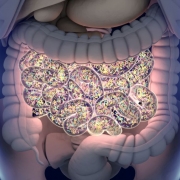Get Your Gut Ready to Go on Vacation
A vacation can clear your mind and take the weight of life off your shoulders. But that exotic location, and the journey to get there, could be hard on one part of the body—your gut.
Don’t let that ruin your get-away. There are three steps to ensure your vacation is a happy time for your guts, too.
Step 1: Learn the reasons why travel can impact your gut health will help you plan appropriately.
Step 2: Follow some simple tips to take with you on your next trip.
Step 3: Just like you’d do with your car before a road trip, check out your gut health before you go. Luckily, there’s a simple quiz below to help you out.
Why Travel Can Create Chaos for Your Gut Health
It’s great that the trillions of microbes in your microbiome fly free. But your guts could still pay a price.
Why does this happen? That’s because anytime you travel, you’re accompanied by the frequently fussy passengers in your intestines. And those annoying traveling companions are the reason your gut health can take a hit while you’re on vacation.
This happens because your outside environment plays a role in determining your interior one. What you eat, what you’re exposed to, and the water you drink all impact your microbiome. Feeding your gut bacteria food they aren’t used to can cause chaos—and gastric discomfort. You can also be exposed to foreign bacteria your body doesn’t quite know how to deal with.
Your microbiome is also impacted by jet leg. They have their own rhythm. When these patterns get upset, so do your guts. Your gut microbes could also shape your appetite while you travel. That’s because research has already shown links between the microbiome and systems regulating your hunger levels. This includes hormones and other mechanisms of the brain-gut axis. So, if you get extra hungry on the plane, you might be able to blame your microbiome.
There are other reasons you might experience gut-health issues while you travel—altitude, chaotic schedules, stress, and less-than-ideal dietary habits. But much of it revolves around the contentment of your microbial travel buddies. Keep them happy during your vacation.
A Few Quick Gut-Health Tips for Smooth Travel
Being mindful of your microbiome is one of the most important things you can do for your gut health—on vacation or at home. Here are five other simple practices that can help when you travel:
- Hydration helps maintain your gut health. And it’s also important to keeping yourself healthy when you’re on-the-go.
- Probiotics can support the overall health of your guts by helping to maintain a balance of good bacteria.
- If traveling has your guts on lockdown, movement might help get your bowels moving, too.
- Plan properly for any situation you might encounter. That means proper vaccinations, bringing the right medicines, and making sure you have healthy foods on hand.
- Don’t leave your healthy diet at home. Eating plenty of fiber from whole grains, fruits, and vegetables could help keep your gut bacteria happy—which is key to your happiness, too.
Gut Check! Take the Quiz
Your gut is at the core of your good health. Before you take off on your trip, answer these seven questions to check the state of your digestive health. You can click the plus sign below each question for more information.
-
How often do you consume high-fiber foods? (fruits, vegetables, beans, oats, nuts, seeds, whole grains)
(3) Frequently
(2) Occasionally
(1) Rarely
Find Out About Fiber
Increasing your intake of fiber may not only be good for a flatter tummy. It also can be good inside your belly, too.
Your gut health reflects the quality of your diet. The microflora in your gut will be dominated by different types of bacteria if you eat a diet high in animal fat, versus if you eat a plant-centric, carbohydrate-rich diet. And your diet is the first place to start if you’d like to improve the health of your digestive system. Transitioning to a healthier low-fat, high-fiber diet can start to make notable changes to the environment of your gut in only 24 hours.
A lack of fiber in the diet may lead to progressive declines in some important bacteria and microorganisms in your digestive tract. Whereas, a high-fiber diet (up to 37 grams per day) is thought to feed good bacteria in your gut. Prebiotic foods help the natural bacteria colonies you already have in your gut flourish. Great prebiotic foods to add to your diet: bananas, berries, legumes, onions, garlic, artichokes, leeks, nuts, seeds, and whole grains.
-
How often do you consume probiotic-containing yogurts/drinks or fermented foods/drinks? (Kefir, kimchee, kombucha, sauerkraut, tempeh, miso, and more.)
(3) Frequently
(2) Occasionally
(1) Rarely
More on the Power of Probiotics
Boosting the beneficial microflora in your gut with probiotics or fermented foods, is a great start in caring for your digestive health. Make sure you look for food and beverages labeled with “live and active cultures.” Remember, heating or other processing can kill the live microorganisms in foods.
-
Were you breastfed as an infant?
(1) Yes
(0) No
(0) Don’t Know
More on the Making of a Microbiome
The method of delivery and the first three years of life are the most important for establishing a healthy diversity of microflora in the gut. Exposure to a wide range of bacteria is key during this time. One important way that parts of the microbiome are transferred is via the mother’s breast milk. Exposure to other family members, pets, a diverse diet, and time in nature are also crucial.
-
How often do you feel a lot of normal, everyday stress?
(1) Frequently
(2) Occasionally
(3) Rarely
Expand on the Impact of Stress
Psychological stress has been associated with weakened gut function when cortisol (a stress hormone) levels also increase. Your gut might be paying the price for normal, everyday stress.
-
How often do you experience bloating after a meal, gas, or constipation?
(1) Frequently
(2) Occasionally
(3) Rarely
See What Might be to Blame for Your Belly Blues
Occasional bloating or gas is normal, but can be uncomfortable. Gas is caused by bacteria in the digestive tract. And how much gas you have can be influenced by swallowed air, what you eat, and the health of your digestive tract. As gas builds up, the abdomen may expand, especially right after eating. This can also be painful … and not just because your clothes start fitting tighter!
You can help beat the belly bloat by avoiding gum chewing, slowing down when you eat, and not drinking out of a straw. Support the normal digestion of high-fiber foods with probiotics and digestive enzymes if certain foods tend to cause gas or bloating. Or, as is the case with lactose intolerance, you may need to identify the culprit and cut it out of your diet.
Occasional constipation is also common and normal. An imbalance of bacteria in your digestive tract is one of the reasons this can happen. It also means your food might not be passing through your system effectively. Maintaining the right balance of microbes will help support the proper function of your digestive tract. Staying hydrated, eating a diet rich in fiber, and getting enough exercise is also important.
(Note: Talk to your doctor about any concerns you have with your digestive system if you answered “frequently” to this question.)
-
How often do you travel?
(1) Frequently
(2) Occasionally
(3) Rarely
Know More Before You Go
Acute stress during travel can give you an upset tummy. Plus, going to novel environments, particularly overseas destinations, and being exposed to new people increases the risk of exposure to different microbes. Your gut may not know how to respond to the new microbes. Disruptions in your sleep schedule could also alter your intestinal flora.
For more information about travel and gut health, see the rest of the story above.
-
How much cardiovascular exercise do you get per week?
(1) 0-60 minutes
(2) 61-90 minutes
(3) 91-120 minutes
(4) 121-150 minutes
(5) More than 150 minutes
Exercise Your Brain with More Facts
Chalk up another benefit for exercise. It’s also good for your gut. As your cardiorespiratory fitness improves, you gut microbial diversity also increases.
Add Up Your Answers to Get Your Gut Check Score
Once you’ve totaled the numbers by your responses, see what your gut check score is telling you.
21–17
Your Gut Feelings: In Great Shape
Your gut is in great shape! Stay focused on eating a high-fiber diet and foods without antibiotics or other chemicals. And keep your stress in check. If you don’t already, try adding a probiotic supplement to get the most out of your healthy diet. Also, if you plan on traveling soon, a probiotic might help reduce the likelihood of mild and common travelers’ stomach upset.
16–11
Your Gut Feelings: Good to Go
You’re taking steps to keep your gut healthy. Way to go! Keep up the good work and take a look at any other improvements you could make:
- Aim for 150+ minutes of exercise per week.
- Try adding some fermented foods or more fiber-rich foods to keep feeding your good bacteria.
- Give a boost to your belly with a probiotic supplement to help maintain overall digestive health.
10 or Below
Your Gut Feelings: Room for Improvement
Your gut may be a little out of balance, so take action today to get your digestive system on the right track. The three most powerful steps that you can take now are:
- Add more high-fiber foods to your diet.
- Keep a food journal to identify any food sensitivities. Then reduce or remove those foods from your diet.
- Try adding a probiotic supplement and/or digestive enzymes to your daily routine to help support digestive health.
References
How to Keep Your Gut Healthy While Traveling. Travel + Leisure. www.travelandleisure.com.
A Trip Overseas Could Change The Bugs Living In Your Gut. Huffington Post Wellness.
Why Traveling Wreaks Havoc on Your Tummy. Women’s Health. www.womenshealthmag.com.
Avoid Digestive Problems While Traveling. Everyday Health. www.everydayhealth.com.
Your Gut Bacteria May Be Controlling Your Appetite. Smithsonian.com.
The Impact of the Gut Microbiota on Human Health: An Integrative View
Exercise Modifies the Gut Microbiota with Positive Health Effects
https://extension.psu.edu/prebiotics-how-to-feed-your-good-bacteria
https://isappscience.org/fermented-foods/
Antibiotics and the Human Gut Microbiome: Dysbioses and Accumulation of Resistances
http://gut.bmj.com/content/54/3/344?utm_source=TrendMD&utm_medium=cpc&utm_campaign=GUT_TrendMD-0
https://www.badgut.org/information-centre/a-z-digestive-topics/intestinal-gas
Intestinal microbiota and chronic constipation
Circadian Disorganization Alters Intestinal Microbiota
The Impact of Diet and Lifestyle on Gut Microbiota and Human Health















